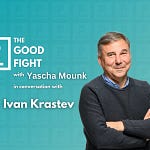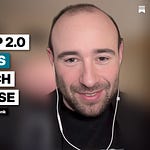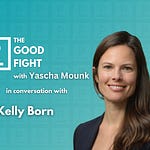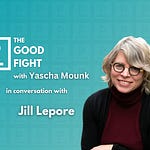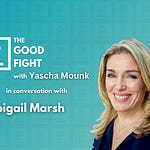Ami Ayalon is the former head of the Shin Bet, Israel’s internal intelligence agency, and former commander of the Israeli navy. After his retirement from the Shin Bet, Ayalon served as a member of the Knesset and co-founded the grassroots peace initiative The People’s Voice with Palestinian philosopher Sari Nusseibeh. He is the author, with Anthony David, of Friendly Fire: How Israel Became Its Own Worst Enemy and the Hope for Its Future.
On the 75th anniversary of Israel’s founding, Yascha Mounk and Ami Ayalon discuss the roots of today’s democratic crisis in the country; lessons from Ayalon’s lifelong career in Israel’s defense and intelligence communities; and why Palestinian hope is an Israeli security asset.
Editor’s Note: This conversation was recorded in April, before the most recent round of violence in Israel and the Gaza Strip.
The views expressed are those of the speakers, not those of Persuasion. The transcript and conversation have been condensed and lightly edited for clarity.
Yascha Mounk: You're somebody who has been engaged in thinking about Israeli democracy and Israeli politics for a very long time. Is the current moment one of special threat to Israel's democratic institutions and the country's future? Or is this just one of many crises in a country that has had its fair share of institutional upheavals and obviously security challenges as well?
Ami Ayalon: I believe that it is the most dangerous threat to our democracy and our identity as a Jewish democracy since the day Israel was created in 1948, on one hand.
On the other hand, it is not a surprise. It is a result of a process that started probably when Israel was created. At least in my case, I started to think about it after [the Six Day War in] 1967. And I understood it after the assassination of our prime minister, Yitzhak Rabin.
Israeli society is, today, a tribal society. We do not share common values. Whether you believe that there are three or five or four tribes, we speak the same language—but we do not share common values. We do not have what we used to call in academia the social covenant, which enables us to agree on a constitution and to live together with all of our differences, but without killing each other. We don't have it anymore. And this is why it is so dangerous.
Mounk: You talk about different tribes within Israel. What do you have in mind by these tribes? And how is it that a resolution to the Palestinian conflict could help these tribes understand each other better—could help them come to a common understanding of what the kind of shared values are that can sustain an Israeli democracy in the long run?
Ayalon: I don't think that the Palestinian conflict will bring us closer. On the other hand, our different approaches to the Palestinian people, in a way, are a part of our [social] conflict. And I think that one of the major rifts within Israeli society is between Jews and Arab, Palestinian citizens of Israel—more than 20% of Israelis are Palestinian citizens of Israel.
And the second rift is between secular and religious people. Although there is huge variety within each community, the more religious you are, the greater the tendency to vote for the right. And the way you see the Arabs in Israel and outside Israel shapes your identity.
I think that between Jews in Israel, the major rift is the way we understand Judaism and the way we understand democracy. This is something that we have to solve [within the Jewish community], and I don’t think Israeli Arabs or Israeli Palestinians can take a major part in this debate.
If you ask me politically, I think that the Israeli left, or center-left, has to understand that when you see the demographics of Israel, in order to be in power politically they will have to join forces with our Arab citizens. When it comes to the understanding of our concept of liberalism or democracy—which means issues like the role and power of the court, or our approach to minorities and human rights—from the center to the left, we can agree with our Arab citizens on everything.
Mounk: I want to come back to what the origins of the crisis are, and why you feel that Israeli society has become tribalized in this way. But first, can you just give a sort of summary, for people who may not follow Israeli politics particularly closely, what the nature of this present threat is?
Ayalon: The nature of the threat is the disappearance of our democracy. But I have to go back. You have to understand that Israeli democracy was born as a very fragile, very weak kind of democracy. We never had three branches of government. The government always controls the parliament via the coalition, and you cannot pass a law that is not approved in parliament that is not approved in our government.
Mounk: As a side note, that seems to me a much broader phenomenon—which is sort of interesting and people are insufficiently aware of—which is that in theory modern democracy is a separation of power between three branches: between the judiciary, the legislature, and the executive.
In some countries like the United States, you do genuinely often have a division between the executive and the legislative branches. That is not true in most countries. For all intents and purposes, that separation between these two branches is much weaker in modern democracy than democratic theory suggests, and I think Israel is one case of that.
Ayalon: In addition to the fact that we don’t have three branches, we don’t have a constitution. We never have had one. And I came to believe it was not by mistake: the government and the executive branch didn't really want to have a constitution. We do not have a tradition or a culture of a democracy, like in Britain. So it's a very, very new and young democracy of people who, yes, feel they have a common denominator—which is a combination of religious and national identity—but we don't have a tradition of living together in a democracy.
So the only limit to the power of the executive branch was a court. In the legal reform being proposed today, the whole idea is to decrease the power of the court, and in a way to create an authoritarian regime, which means that the government can do everything.
On the surface, the idea for how judges are elected is a major issue. But as I said before, I think that our divisions and the rifts between the tribes started much earlier. This is why so many people in the streets are now demanding a constitution. But I think that it's impossible to come up with a constitution now, because you cannot impose a constitution. The rifts are growing deeper and wider. And if we try, I believe that we will face violence from both sides. So it's very complicated.
There is a lot of energy in the street. And I see it as a very optimistic sign, a positive sign—because for the first time, people understand that democracy was not given to us, by God, and it was not given to us as a present. We have to fight for it. We have to win this battle every day. People are studying the basic concept of democracy in the streets. They finally understand that we have the right, we have the ability—and in times of crisis like today, we have the duty—to take to the streets. Otherwise, we will lose it.
Mounk: I'm going to be the advocate for people who know less about Israeli politics here. So I'm going to push you to explain more of what's going on, if that's okay. The role of Supreme Courts in liberal democracy is complicated, right?
I have defended the need for strong forms of judicial review when it comes to the basics of democratic institutions. The most important thing is that when an executive is overstepping the boundaries of the rightful authority, you need to have some kind of other power from the state to be able to say, “hey, that is not actually what the basic rules of our society—whether it’s a constitution or a Basic Law—allow the president or prime minister to do.” I also worry, and I've written in The People vs. Democracy, that the sort of authority to do that and legitimacy to do that is often undermined when courts start to become quasi-policymakers.
So explain to us: in the Israeli context, what are the complaints from the right? That the Israeli Supreme Court had grown hugely in the realm of decisions, I understand. Is there something to that complaint? How is what Netanyahu is doing to rein in the court going beyond that? (I'm sympathetic to your point here, but explain to us how this reform starts to threaten democratic institutions.)
Ayalon: In your question you mentioned twice the power of the court versus the legislative branch. But there is no legislative branch in Israel. I said it before: because the government controls the parliament, you cannot pass any law that is not approved by our government. So forget about parliament in Israel. In fact, there is no legislative branch in Israel.
You said it's like this in many other democracies. I know nothing about other democracies. Israel is a very unique case, because we don't have a constitution. And, in addition—this is something very unique—we did not separate religion from politics, or religion from the concept of national identity.
So, what we see today is that the court found itself dealing with these dilemmas. For example: we say Israel is a Jewish democracy and this is, I think, agreed by most people. But what do we mean when we say “Jewish democracy?” What is our Judaism? And what is our democracy?
I do not accept the racist concept of Judaism that is brought to us by Rabbi Kahane [a Jewish ultra-nationalist whose party was expelled from the Knesset] and by Bezalel Smotrich [a far-right politician serving as finance minister in the Netanyahu government] and by Itamar Ben Gvir [a far-right politician serving as national security minister in the Netanyahu government]. Ben Gvir, by the way, was accused of being a supporter of a terrorist organization. He was one of the people who led the people that tried to assassinate our prime minister, Yitzhak Rabin. And today he is a minister. His concept of Judaism is a racist concept of Jewish supremacy. This is totally unacceptable to me and to, I believe, 90% of the people who are living in Israel.
Mounk: What's his conception of Judaism?
Ayalon: In one sentence: Jews are better, and they deserve more civil rights, than any other citizen of Israel who is not a Jew. That summarizes almost everything.
Mounk: I think this goes to the heart of something that critics of Israel would push on. I know that you are obviously somebody who is both a defender of the State of Israel, somebody who's had great military responsibilities in defending Israel, but is also very critical of some aspects of contemporary Israel as well.
What does it look like to have a Jewish democracy that refutes that point, which is to say: How is it possible to have a state that is defined in important ways by being Jewish, while giving equal rights to non-Jewish citizens of the state? Is that balancing act possible?
Ayalon: It's a great question. We have to go back, at least to 1948. And probably even before that, to the beginning of the Zionist concept.
Mounk: Let’s do it, let’s go back.
Ayalon: I’m not a historian, and I’m not a philosopher. But once we ask the question, we have to try and answer. I start by asking: when we say “democratic Jewish Israel,” what do we understand as the character of our Judaism? And what is the nature of our democracy?
Now, it's very complicated because if we ask this question, we have to try to come up with an ideal of Judaism. For 2,000 years, it was a very pluralistic concept: Jews lived all over the world, in different communities, and each community, in a way, created or designed its own concept of Judaism.
Once we created a state, and we did not separate religion from the state and from its politics, we had to ask this question. The founders of the Zionist movement discussed it. They wrote books or books about it, all of them: Herzl, Jabotinsky, Begin, Berl Katznelson, David Ben Gurion. All of them jumped into the future and envisioned the State of Israel years before it became a real state, and they gave answers. But this debate, this public discussion, stopped from the moment that we created the State of Israel. We were very occupied, defending ourselves, fighting against all the enemies around us.
Today, we understand that our major threat—more than Iran, or Hezbollah, or Hamas, more than Islamic Jihad—is the divisions, the rifts between the Israeli tribes. And this is why when we ask this question we have to give a specific answer.
If you ask me, I believe that if we dig deep enough into the roots of our tradition in the Bible, we will be able to find the concepts, the values that, in a way, created the concept of democracy years later. I'll give you an example. The fact that all humans are equal is a Jewish concept. Go back to the Bible, the concept that all humans were created by God. This is the beginning of the Torah. It means that all humans are equal. […] So you can find all these ideas, all these values, if you go deep enough. And the idea is to come to a place where our definition of the identity of Israel will be that the more Jewish Israel is, the more democratic it is. Democracy does not contradict Judaism—only if we can choose the right Judaism, and the right concept of democracy.
Mounk: How has your answer to that question evolved over time? Are the values of Israel's founding the right ones, but have become corrupted over time? Or was this in part a problem at the founding and that's being expressed now? And how has the experience of conflict with the Palestinians informed the evolution of your thinking on this?
Ayalon: Martin Luther King said once—and it is very, very relevant to our situation today—none of us will be free until all of us will be free. Palestinians are not free. And as long as we control the daily life of millions, we will not be free because they will not be free.
If you ask me why we didn’t discuss the topic before today, my answer is easy: it was too difficult. And the easiest way was to go out and to fight our enemies from outside.
Mounk: So how did your view on this evolve? You started your life off as a soldier. You are one of the more decorated soldiers in Israeli history. You clearly had a security lens through this. In its early years the state of Israel was very embattled. When did you start to think or start realize the main threat to Israeli security and prosperity is not military, but comes from these challenges?
Ayalon: I am ashamed to say that it took me many years.
I was born in the Jordan Valley. The Syrians were up above on the Golan Heights. And the Zionist concept of my parents, I believe, was based on a very basic idea: “settlement and security.” They came from Europe, with the idea that the Jewish people are facing a major threat. It was before the Holocaust. My mother came as a child. My father arrived as an illegal immigrant during the British Mandate in the 30s.
Their idea was to create a state for the Jewish people, in order to save the Jewish people. This was a Zionist concept: the only idea that could save us from antisemitism, pogroms, violence, and later the Shoah, the Holocaust, was to create our own state and to defend ourselves. So the future state of Israel would be wherever we can build a settlement, work the land and defend ourselves. They did it in the Jordan Valley. They pushed the border to the east as much as possible. And this is why every time when they went out to work the land, Syrians shelled our settlements, and we spent many days in shelters. But it was okay; this was a price that we had to pay.
And this was a concept that brought me to volunteer for the naval commandos. The idea was to do it for four years and come back to the kibbutz. But after four years, we had the Six Day War in 1967 and we found ourselves in the War of Attrition [a quasi-war between Egypt and Israel that ended with the outbreak of full hostilities in the Yom Kippur War of 1973]. And it was the first time I remember that I felt like my father—that the whole security of the state is on our own very, very narrow shoulders. So I stayed in the navy. My friends from the kibbutz went to build settlements in the Jordan Valley, in Sinai, in the Golan Heights. Settlements were not originally an idea of the far right. In Israel, it was the labor movement that pioneered the settlements.
After 1967 [when Israel captured the West Bank, Sinai, and the Golan Heights] we felt like liberators: “This land is ours.” We learned it from our childhood. I did not follow religion in the kibbutz. It was a very secular concept, a very secular way of life. But the stories of the Bible were the stories of my childhood. So we felt like liberators and it took me 20 years to understand that, yes, we liberated places, and probably that were given to us by God. But we became a very, very violent oppressor, an occupier of millions of Palestinians who hate us because we deprive them of their rights, and we deprive them of their national identity.
Especially after the 1960s, they saw themselves as a people. They fought since then, and they are fighting today, in order to create a state alongside Israel, a Palestinian state, and they are using their right as a nation to create a state.
Meir Shalev [an acclaimed Israeli author who served during the 1967 war] just died several days ago. And he told me that he understood what the consequences of the occupation would be immediately in 1967. I understood it only 20 years later, during the First Intifada.
During the First Intifada, I was a deputy commander of the Israeli Navy. And I found myself, with only my driver, facing dozens of youngsters. And I saw the eyes of a young Palestinian from, I don't know, probably 3 or 4 meters. He had a rock in his hand. And you could see that all he wanted to do was to kill me. He was not armed, so I couldn't shoot him. But I understood.
Today, the way I understand myself, Israeli society, and the realities of the Middle East is a result of my years in the Shin Bet. I became the director of the Shin Bet after the assassination of Prime Minister Rabin, and held the position for four and a half years. This was a big change, because the Shin Bet is involved in a totally different type of war.
During all my years in the Navy—I'm not proud of it—I killed many people. Probably too many. Something later became very strange to me: I never knew anything about the people whom I killed, and I didn't care. I didn't need it in order to kill them. We send soldiers and warriors to kill, not to negotiate.
But once you become a member of the Shin Bet, or internal security, and you're fighting terror, you have to know everything. For every terror activist, you have to know his full name, because it will give you something about his background, history, and family. You have to know with whom he prays, who are his neighbors, his children, grandchildren, family, wife; otherwise, you will not understand. You will not be able to interrogate him, you will not be able to recruit him, and you will not be able to understand the origin of his hatred, which is the origin of his violence. And if you do not understand you will not be able to win this war. So suddenly, it is a totally different kind of war, to fight and to win.
You don't have to agree with him. Sometimes you know that the moment that he will be released from jail, he will go on killing your friends and your fellow citizens. But you understand his motives. And suddenly, you understand that he is not a military target. He is not somebody that you have to kill. He is somebody that you have to understand. And, yes, we have to face them. But unless we understand them, we will not be able to win.
I also learned a second lesson in the Shin Bet. It was the first time when I understood that the Israeli-Palestinian equation is very simple: We, Israelis, will have security when they, the Palestinians, have hope.
When I say this to my friends in Israel, they tell me “you’re crazy. We just have to use more violence.” I say “no. The more violence we use, the less effective we will be. I believe we will have to come to an agreement with the Palestinians. I believe—although it is a dream today, and nobody in Israel is ready to talk about it, and probably it will not be in my lifetime—that finally we shall live side by side. Because there is no other option.
Mounk: What would the solution look like? Is that a two state solution? Is that a different kind of solution? What, in concrete terms, would it mean to achieve that peace?
Ayalon: First of all, it will be only after violence, after a crisis.
I saw it after the Yom Kippur War: we signed a peace agreement with Egypt. After the First Intifada, we came to Madrid and then to Oslo to negotiate with the Palestinians, although it didn't work. After the Second Intifada, we pulled out of Gaza. So only in times of chaos and violence, we understand that there is no other option.
We have only two options. One is [a one-state] democracy from the Jordan River to the Mediterranean, in which Jews will not be the majority, which is not acceptable to the Israelis or the Palestinians.
If we have just one democracy, from the Jordan River to the east to the Mediterranean to the west, it will not be a Jewish democracy. And it will not be a Palestinian democracy. It will not be a democracy altogether, because it will be something similar to what we saw in Syria and what we see today in Lebanon. Muslims are killing each other for the “right” Islam, and, in Lebanon, conflict between Christians, Druze, Muslims etc. In the Middle East [such multiethnic democracy] will not work.
This is why the only option left for us is two states. And by the way, the parameters are very clear. They were almost agreed on the political level, but people did not accept it, because we did not think that this is the price that we should have to pay. The assassination of our prime minister was exactly on this issue—on the idea of a minority of radical Jews, who are ready to kill, just in order not to give a piece of our land to somebody else.
So the parameters will be, in a way agreed upon, two states for two peoples: a Palestinian state alongside a Jewish state, with the borders based on the pre-1967 lines. We swap territories based on security, demography and continuity, with the right of return for Palestinians and Jews. For example, Palestinians shall return only to the State of Palestine, and Jews shall return only to the State of Israel. Palestinian refugees will be compensated. And they will have to choose whether to go back to Palestine, to third countries, or to become citizens in the places where they live now.
The international community will have to guarantee to secure the borders and security. In Jerusalem, Arab neighborhoods under Palestinian authority, Jewish neighborhoods will be under Israeli sovereignty. For security, Palestine will have a very powerful police force. For the holy places—this is the only place in which in a way we create something new—sovereignty in the holy places belongs to God, but the Wailing Wall, and all the area around it will be secured and controlled by the State of Israel for the Jewish people. Haram al Sharif [the Noble Sanctuary/Temple Mount, site of al-Aqsa Mosque and the Dome of the Rock] will be like the status quo, controlled by Islam. And the holy church in Jerusalem will be controlled by the Christian sects.
Again, I don't think I will see it in my lifetime. But if you ask me, this will be the future.
Mounk: One argument that's often made, especially on the left, is that, because of the extent of settlements now in Palestinian territory, and perhaps because of the length of the conflict, it's too late for the two state solution. Somehow, the argument goes, the time has passed so that it has become either practically impossible or morally wrong.
What's your answer? Why do you think that they're drawing the wrong conclusion when they say that it's time to give up on the two state solution?
Ayalon: In history there is no “too late.” And there is no irreversible situation. It's nonsense. Sometimes, we see a revolution.
Many years ago, Jews used to say that on the road to redemption, there are ups and downs. And when somebody tells me, “it's too late,” I say: Today it's too late. But when we will face violence, and when we come to understand the price that we are paying, I believe that we will prefer security, and life, to history. We will do what most societies and what most religions do: we will create flexibility.
I once met a rabbi who was a settler. It was after the assassination of the prime minister. I asked him “what will you do if the government of Israel comes to an agreement with the Palestinians in which we give back some places in Israel in order to see Israel as a Jewish democracy? If this is our only chance to see Israel as a Jewish democracy, and it means that you will have to come to your community and to tell them, ‘Look, we have to take our furniture, our children, our grandchildren, our Torah with us and to go back to the State of Israel, or to another place in the land of Israel. And this is the price that we have to pay.’”
And he said, “Ami, it's not a religious or theological problem. I can use the Bible in order to explain it. The Land of Israel does not belong to us, the Land of Israel belongs to God. Sometimes he gives it to us. Sometimes he doesn't. We don't know exactly what his reasons are, but for 1000 years, it was not ours. So we can live with the idea that this is ours, but it is kept by God for another time. And when the Messiah will come, it will be ours.”
I'm not a rabbi. And I don't know how many of his followers will accept this answer. The only thing I am telling you is that I believe that when the time comes—and unfortunately this is the sad aspect of my optimism, that the time will come only when we shall face violence, and we understand the price that we have to pay—we will prefer to see Israel as a Jewish democracy. Even if we have to give up some land in Israel in order to see it happening.
Read More: “Why I Worry About Israeli Democracy” by Amichai Magen
Please do listen and spread the word about The Good Fight.
If you have not yet signed up for our podcast, please do so now by following this link on your phone.
Email: podcast@persuasion.community
Podcast production by John T. Williams and Brendan Ruberry.
Connect with us! Spotify | Apple | Google
Twitter: @Yascha_Mounk & @JoinPersuasion
YouTube: Yascha Mounk, Persuasion
LinkedIn: Persuasion Community







